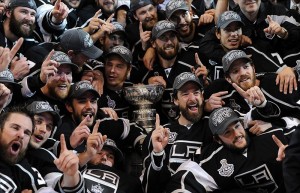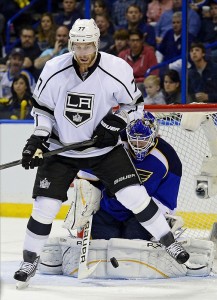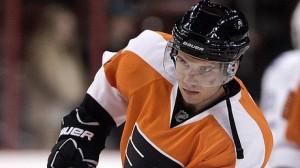
“L.A’S NEW ROYALTY” read the bold text on the front page of Tuesday’s Los Angeles Times. At the center of the feature photo is the most recognizable trophy in all of sports: The Stanley Cup. Just to the left is the familiar grin of Jeff Carter. The Times’ Helene Elliot’s cover story just below eloquently outlines a Kings season full of turmoil and hardship that came together at the perfect time. Not one of Elliot’s 1,184 words mentions the Flyers or the trades Paul Holmgren made last summer.
In Philadelphia, the headline on Philly.com is “Former Flyers help Los Angeles Kings win Stanley Cup over New Jersey Devils.” A sort of narcissistic way of honoring the team many Philadelphians have come to call “Flyers West.”
As a result of the recurring storylines emphasizing the similarities between the Kings and Flyers that have plagued newspapers on both coasts over the past nine months, many members of the Flyers faithful have developed a freshly brewed disdain for Mr. Holmgren, and the blockbuster trades he made a year ago. The heavily bearded smile on Mike Richards’ face as he hoisted Lord Stanley’s glorious chalice certainly stung for many Flyers fans who ask themselves, “what if?”
What if Mike Richards’ still wore number 18 and had that shiny white “C” above the Flyers logo on his jersey? What if Jeff Carter’s twisted wrister and world-class speed had been there to help the Flyers in the 2012 playoffs? What would have changed?
Nothing.
Sure, Carter and Richards’ 13 and 15-point (respective) postseasons were an integral to Los Angeles’ dominant playoff run. Would the Kings have won without them? Probably not. And, this is where the debate ends in most cases.
But, in reality, this is where the debate really begins.
The Perfect Fit
Hockey doesn’t follow mathematical principle. Especially not the transitive property. Saying the Bruins are better than the Sharks because the Bruins beat the Canucks, who beat the Sharks, is a dangerous way of comparing teams in any sport, not just hockey.
It’s easy to think, Carter and Richards were traded to a new team that won the Stanley Cup in their first season together. They’re winners. And, if they were back in Philadelphia, the Flyers would have probably won it too.
The transitive property fails in hockey because it ignores key factors like setting and character.

The bright lights of Hollywood illuminate far more than just the city’s athletes. Movie stars and musicians often find themselves in Los Angeles’ spotlight more often than a gritty hockey player from Kenora, Ontario. Richards admitted he enjoyed the freedom from Philadelphian scrutiny in his new home in California. Carter too was often the subject of much speculation for his reputation as a heavy partier. 3,000 miles away from the jungle on the corner of Broad Street and Pattison Avenue, and the burden of captaincy amid the sea of orange inside the Wells Fargo Center, there is no doubt there was a certain weight lifted off the shoulders of Mike Richards and Jeff Carter when they donned the Kings’ black and white.
Moreover, Mike Richards and Jeff Carter won the Stanley Cup in L.A because they were the perfect players to fill voids in the Kings lineup. Los Angeles was eliminated in the first round of both the 2010 and 2011 playoffs with a lineup similar to the one that won them a cup this season, minus Richards and Carter, of course.
Everything seemed to come together at the right time in Los Angeles. Anze Kopitar was back to his crafty playmaking ways, and Dustin Brown distinguished himself as not only one of the NHL’s most well-rounded players, but a playoff performer capable of captaining his squad to a Stanley Cup. Richards and Carter were the perfect second line support players to an already stellar roster.
Not to mention Conn Smythe winner Jonathan Quick. Quick’s superb reflexes and unparalleled athleticism in goal was the backbone of the Kings’ winning formula. While Ilya Bryzgalov played adequately in the 2012 playoffs, he and the Flyers learned that adequate is not enough when pursuing the most grueling trophy in all of sports.
The Emergence of Claude Giroux
As Jeff Carter and Mike Richards settled into their new roles as SoCal secondary scorers, back in Philadelphia, budding superstar Claude Giroux embraced the widened spotlight, tearing through defenses like no Flyer since Eric Lindros. Giroux was determined to prove he could fill the spots left by Richards and Carter. During the 2011-2012 campaign, Flyers fans learned that when Claude Giroux is determined to get something, he gets it. Giroux’s 93 regular season points earned him a spot among the league’s top players. Could Giroux have had such a fantastic regular season and have been tied for the NHL lead in playoff goals–despite playing half as many games as the other leaders–had he been playing in a supporting role behind Richards and Carter?
Probably not.
The Future

Aside from the immediate impact visible in Claude Giroux’s game, the trades that Paul Holmgren manipulated last summer also put the Orange and Black on a path destined for a successful future. Acquiring 22 year-old Jakub Voracek and the first round pick that would eventually become 19 year-old Sean Couturier, the Flyers exchanged Jeff Carter for some promising youth. Couturier especially has already proven himself as one of the best young players in the entire NHL.
In the other blockbuster trade, Mike Richards was replaced by the highly touted young prospect Brayden Schenn, and a gritty, two-way forward in Wayne Simmonds. Schenn, whose physicality and knack for the open spots on the ice really flourished in the final months of the season, is projected by many experts to become a more offensively gifted version of Mike Richards. Add in 23 year-old Wayne Simmonds surprising goal-scoring ability and quick assimilation into the role of fan favorite, and there’s a pretty balanced trade.
The Flyers rookie corps have already established themselves as one of the most prominent in the entire NHL having played a combined 435 games and scoring a total of 129 points this season. Considering the expected turnaround time when a team “gets younger”, the Flyers season was far from a disappointment. Even if it ended before most Flyers fans would have liked, the 2011-2012 season was a nice preview of things to come for this young and talented Flyers team.
Mike Richards and Jeff Carter are world-class hockey players, who could add a dynamic facet to the offense of any team in the National Hockey League. On some teams, they would be good, but not good enough. Just ask the 2010 Flyers.
Ask any general manager in the league how he decides which players to sign and trade for, and he’ll likely say something about “finding the right pieces to really blend together.” Each player is a piece to the puzzle. Each piece can only fit in one spot. For the Los Angeles Kings, Mike Richards and Jeff Carter were the last two pieces that were hiding somewhere under the coffee table.
Congratulations L.A. The puzzle is complete.
Reflects my thoughts exactly. When the Flyers uprooted Carter and Richards it wasn’t because they were bad players. It had already been established how powerful they were on the ice. But people forget exactly how long those two had actually been in Philly, going back beyond their CalderCup win with the Phantoms. I feel they had grown complacent and Richards’ inability (or refusal) to learn from Chris Pronger sent him further down the path of not caring as much about hockey. The trades woke both players up in a big way, obviously.